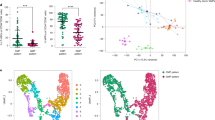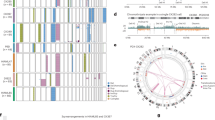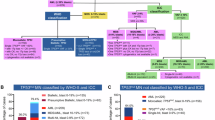Abstract
We have previously reported that vitamin K2 (VK2) has a potent apoptosis inducing activity toward various types of primary cultured leukemia cells including acute myelogenous leukemia arising from myelodysplastic syndromes (MDS). We established a novel cell line, designated MDS-KZ, from a patient with MDS in blastic transformation, and further investigated the effects of VK2 using this novel cell line. MDS-KZ shows complex chromosomal anomaly including −4, 5q−, −7, 13q+, 20q−, consistent with that seen in the original patient. Culture of MDS-KZ cells in RPMI1640 medium containing 10% FBS lead to steady but very slow proliferation with a doubling time of 14 days. However, the cellular growth rate was significantly accelerated in the presence of various growth factors such as granulocyte colony-stimulating factor, stem cell factor, granulocyte–macrophage colony-stimulating factor, interleukin-3, and thrombopoietin. Most of the cultured cells show the morphological features of myeloblasts. They are positive for CD7, CD33, CD34, CD45, CD117, and HLA-DR. However, about 10% of the cells are more mature metamyelocytes and neutrophils with various dysplastic characteristics such as pseudo-Pelger nuclear anomaly and hypersegmentation, suggesting a potential for differentiation in this cell line. As previously reported for cultured primary leukemia cells, exposure to VK2, but not to VK1, resulted in induction of apoptosis of MDS-KZ cells in a dose-dependent manner (IC50: 5 μM). In addition, VK2 treatment induced down-regulation of BCL-2 and up-regulation of BAX protein expression with concomitant activation of caspase-3 (CPP32). A tetrapeptide functioning as antagonist of caspase-3, Ac-DEVD-H, suppressed the VK2-induced inhibition of cell growth, suggesting that caspase-3 is, at least in part, involved in VK2-induced apoptosis. These observations suggest that the MDS-KZ cell line can serve as a model for the study of the molecular mechanisms of VK2-induced apoptosis.
This is a preview of subscription content, access via your institution
Access options
Subscribe to this journal
Receive 12 print issues and online access
$259.00 per year
only $21.58 per issue
Buy this article
- Purchase on SpringerLink
- Instant access to the full article PDF.
USD 39.95
Prices may be subject to local taxes which are calculated during checkout
Similar content being viewed by others
Author information
Authors and Affiliations
Rights and permissions
About this article
Cite this article
Nishimaki, J., Miyazawa, K., Yaguchi, M. et al. Vitamin K2 induces apoptosis of a novel cell line established from a patient with myelodysplastic syndrome in blastic transformation. Leukemia 13, 1399–1405 (1999). https://doi.org/10.1038/sj.leu.2401491
Received:
Accepted:
Published:
Issue date:
DOI: https://doi.org/10.1038/sj.leu.2401491
Keywords
This article is cited by
-
Anti-apoptotic effect of menaquinone-7 protects the brain of ovariectomized rats
Beni-Suef University Journal of Basic and Applied Sciences (2023)
-
Pharmacological targeting of bone marrow mesenchymal stromal/stem cells for the treatment of hematological disorders
Inflammation and Regeneration (2017)
-
Vitamin K deficiency leads to exacerbation of murine dextran sulfate sodium-induced colitis
Journal of Gastroenterology (2016)
-
ABL-specific tyrosine kinase inhibitor, STI571 in vitro, affects Ph-positive acute lymphoblastic leukemia and chronic myelogenous leukemia in blastic crisis
Leukemia (2001)
-
Apoptosis/differentiation-inducing effects of vitamin K2 on HL-60 cells: dichotomous nature of vitamin K2 in leukemia cells
Leukemia (2001)



